BLOG
Find support not just for emotional eating, but all aspects of your well-being.
3 Ways Group Therapy Will Transform Your Emotional Eating
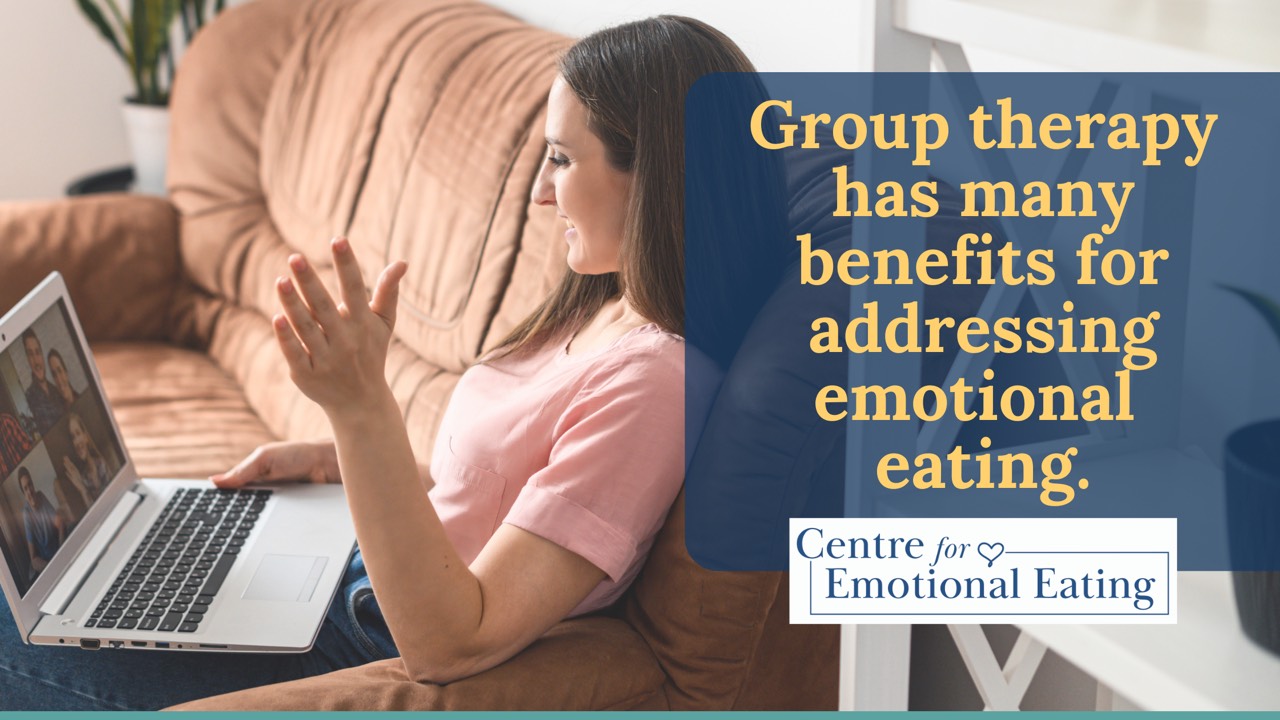
In addition to growing my one-on-one registered psychotherapy practice, over the years I ran emotional eating groups using pre-created content. I could see the power of the group concept, but the material wasn’t the right fit. So, I created The Quiet Craving, a program based on my experience of more than a decade of working with clients who emotionally eat and as a group leader.
I know that many people are hesitant about group therapy, especially when it comes to something as vulnerable as emotional eating. It is something that thrives when hidden and there is a societal belief that eating is “simple” and that you should “just be able to get a handle on it.” Bringing your experiences out in front of others can feel incredibly scary but, again and again, I have seen the transformational experience of group therapy for emotional eaters.
If you’re tired of emotional eating and intimidated by group therapy, this blog post is for you! Read through the powerful ways group therapy can trans...
Supporting Your Mental Health at Work
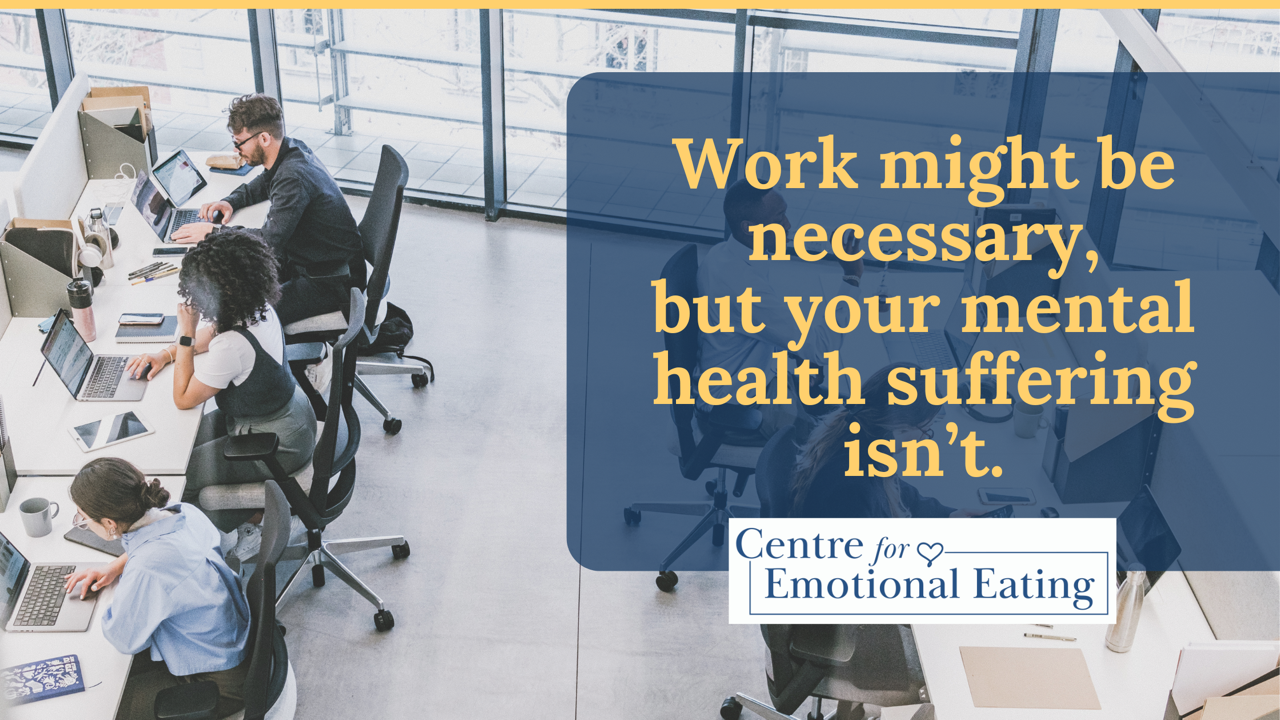
No matter what you do for work, chances are it is a stressor in your life. Even if you enjoy your job, there might be tasks or colleagues you’d rather not deal with. Work is a necessity not just for income, but also purpose, goal setting, community, and future planning.
That doesn’t mean it isn’t stressful.
Below are a number of ways you can support your mental health as a worker.
Basic Maintenance Goes a Long Way
You might already know that routines, rituals, and structure can support your well-being, so focusing on identifying working hours (and rest or play hours), practicing good sleep hygiene, and implementing boundaries around your work phone or logging in can be incredibly helpful for supporting your mental health. It can also be helpful to create a transition ritual where you let your nervous system know that you are changing from work you to home you. Listen to a meditation app on your commute or change clothes as soon as you are home. These can signal to your body that it...
Set Goals with Self-Compassion
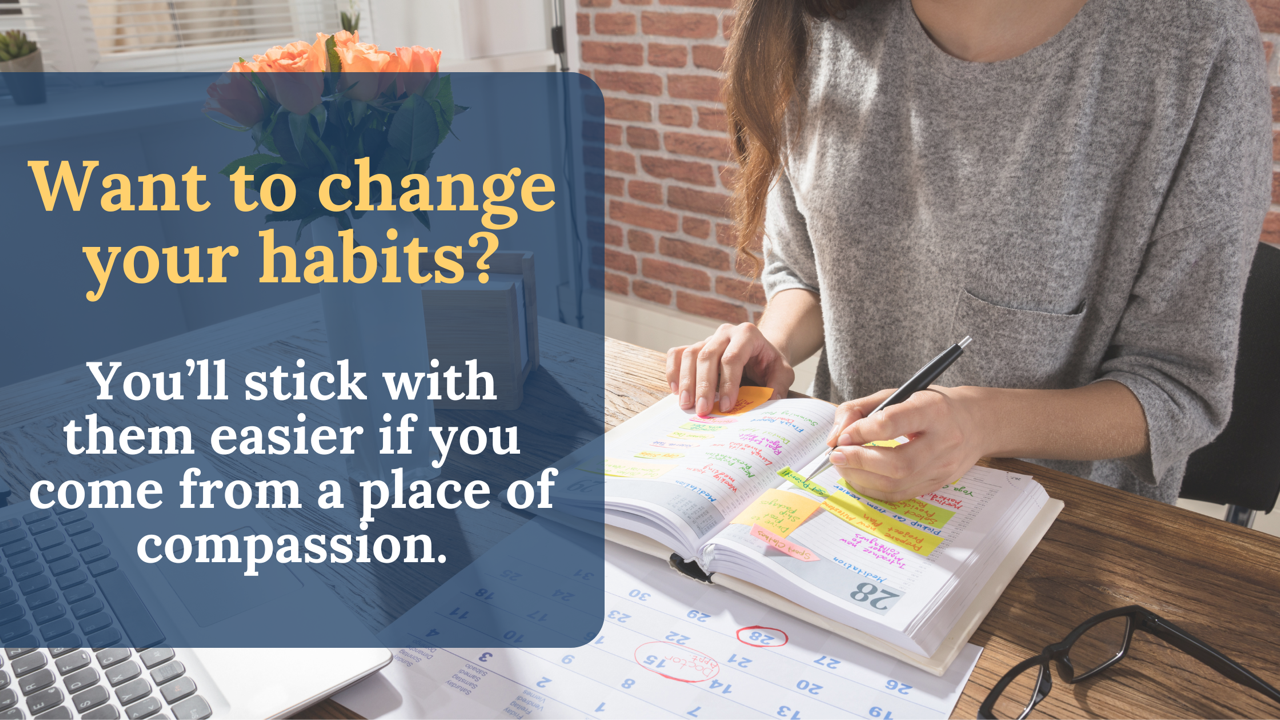
With the start of a new week, month, or year, it can be tempting to overhaul your life. This might look like starting a new diet, adhering to an intense exercise regime, doing a detox, or trying to white-knuckle your way to change.
How often have you tried this approach?
It isn’t a bad thing to want to change your habits, but how often does your motivation start out from a place of criticism or feeling not good enough? You can’t hate yourself towards change. Instead, coming from a place of compassion is a great way to soothe and support yourself!
Consider The Words You Use
When coming from a place of compassion, you don’t tear yourself down by picking apart your body or criticizing your abilities. This inner critic can be really mean! You can start by asking these two helpful questions when this inner voice gets loud. The next step is to start changing the words you use to talk about yourself. It doesn’t have to be fake or super positive, you can aim for neutral comments like “I am...
Real Scripts You Can Use this Holiday Season
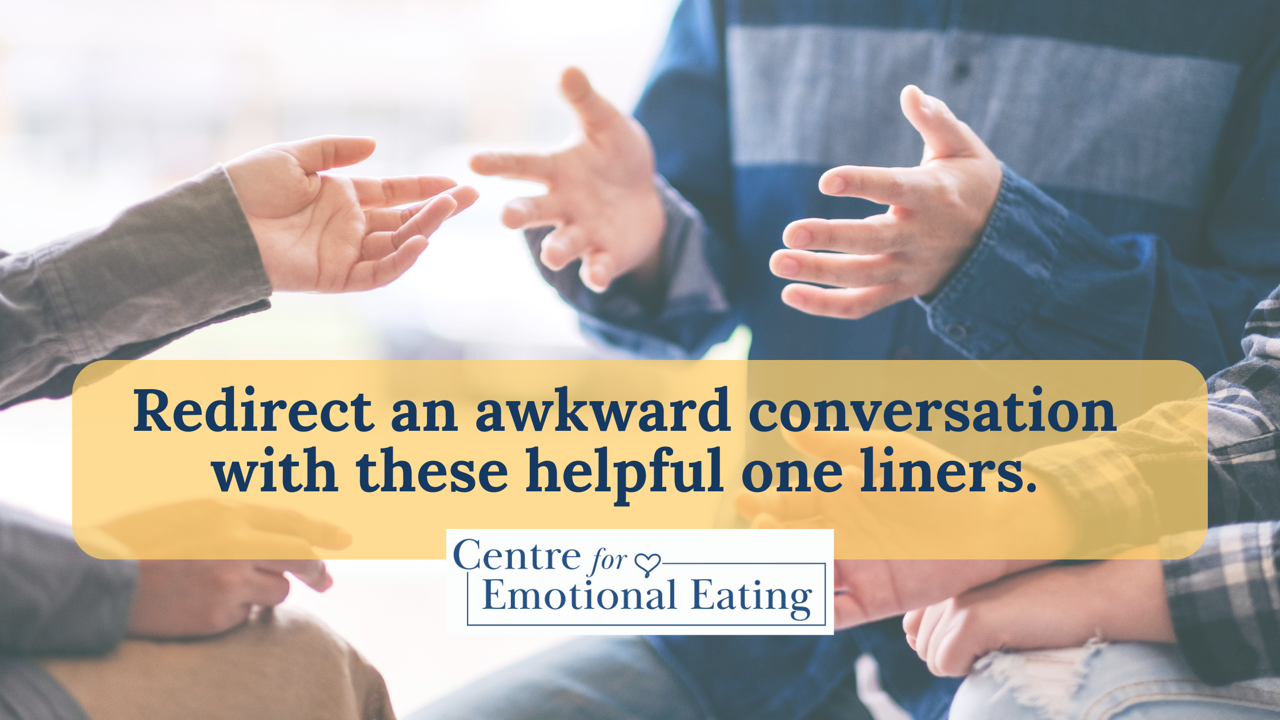
Social gatherings can be stressful at the best of times: they require your time, energy, money, and you have to figure out what to wear. Add in the expectation that someone will comment on your weight, what you’re eating, how you vote, or how you choose to live your life and the anxiety can build as soon as the event is on your calendar.
If you are already dreading a few get-togethers on your calendar, below are some helpful scripts you can use to shut down unwanted comments and criticism. Read through and choose which ones might be helpful to you. Feel free to bookmark this blog post or take a screen shot on your phone so you can come back to this anytime you need to feel empowered to redirect an uncomfortable conversation.
Try being warm and polite:
- “It’s the holiday season, let’s focus on the positive. What are you excited about right now?”
- “Let’s keep things light today. Tell me something wonderful that’s going on with you lately?”
Try being gentle but clear:
- “That is ...
Befriending Your Inner Critic
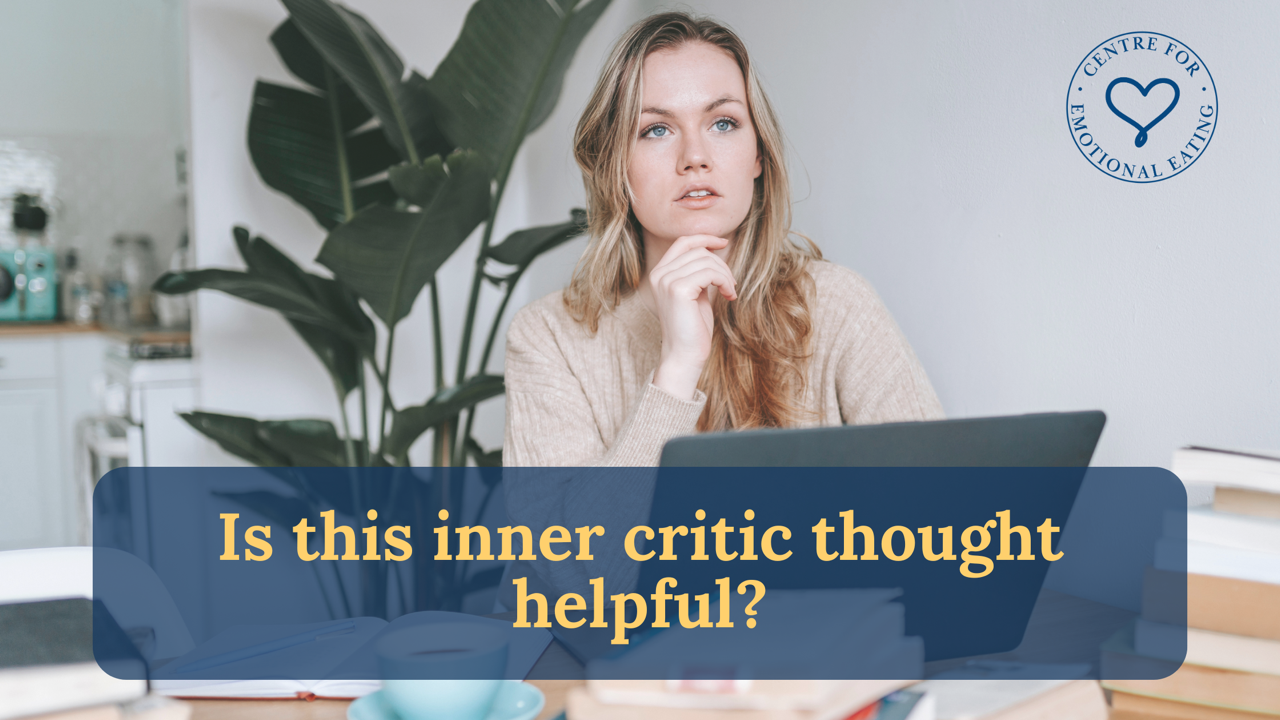
Managing your inner critic can be difficult. Its comments are cruel, judgmental, and criticize everything from your body to your intelligence to your dreams. That voice inside tears you down with comments taken from friends, family, society, and social media. Sometimes they are word-for-word and sometimes your inner critics twists them to be extra painful. We tend to internalize these negative ideas and our brain feeds them back to us as if they are true.
They aren’t.
There are a few ways to address your inner critic. I’ve talked before about how to push back against these inner comments (without falling into toxic positivity!) and today I want to give you another strategy to try out: listening to your inner critic.
Now, that doesn’t mean believing your inner critic. When thoughts like “You’re so dumb” or “No one likes you” come up, see if you can sit with them for a moment. These thoughts often jump to the surface when you’ve been triggered by a situation and your immediate action ...
How to Set Personal Boundaries
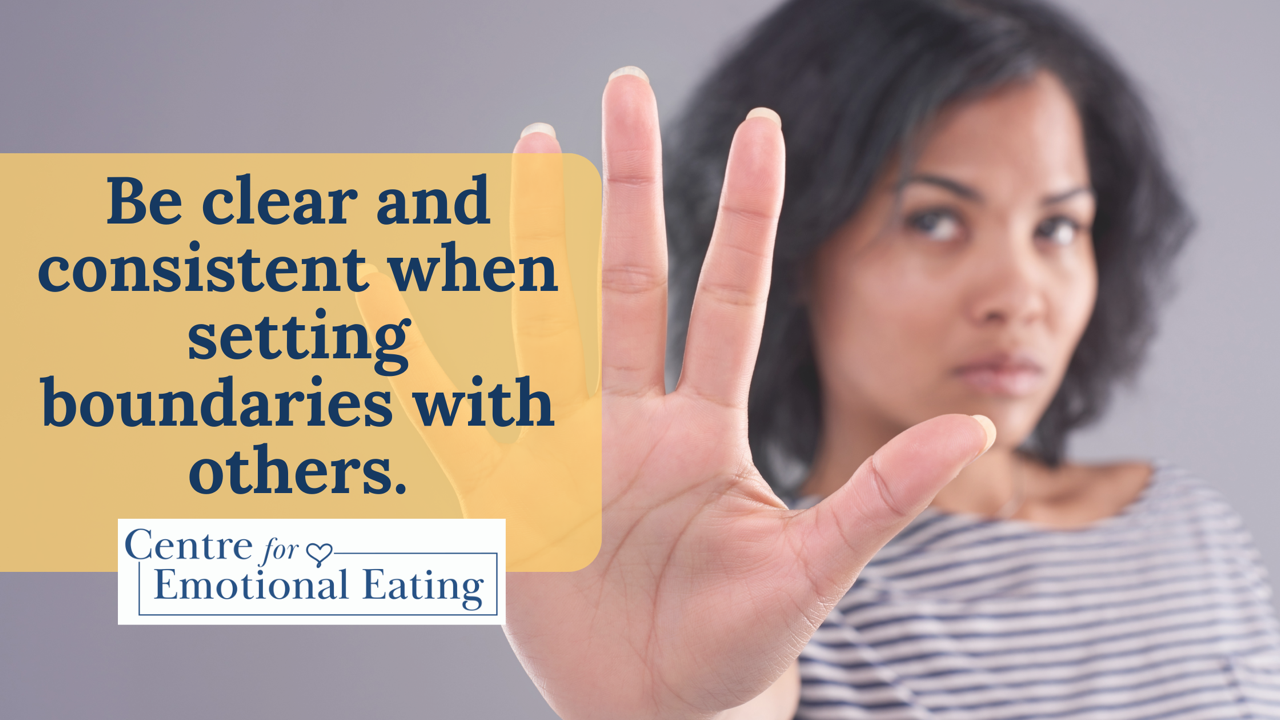
Setting boundaries with other people can feel very challenging. It pushes against our desire to keep the peace, challenge those we love, out of fear of rejection. But they are an essential part of maintaining your well-being and healthy relationships.
Benefits of Boundaries
Your boundaries are personal to you—they’re the guidelines you set to protect your body, mind, energy, and lifestyle. That’s a pretty powerful thing. For example, setting boundaries with others can include how frequently or quickly you respond to calls and texts, saying “no” when you don’t have time or interest in something, or pushing back on critical comments.
While you might feel uncomfortable to set boundaries, doing so can support your mental health, financial stability, help you feel more confident, and even create healthier relationships. Often others will respect you for knowing what you are and aren’t comfortable with, and stick with it.
While you may need to communicate your boundaries to others, you d...
Create A Routine That Brings You Peace
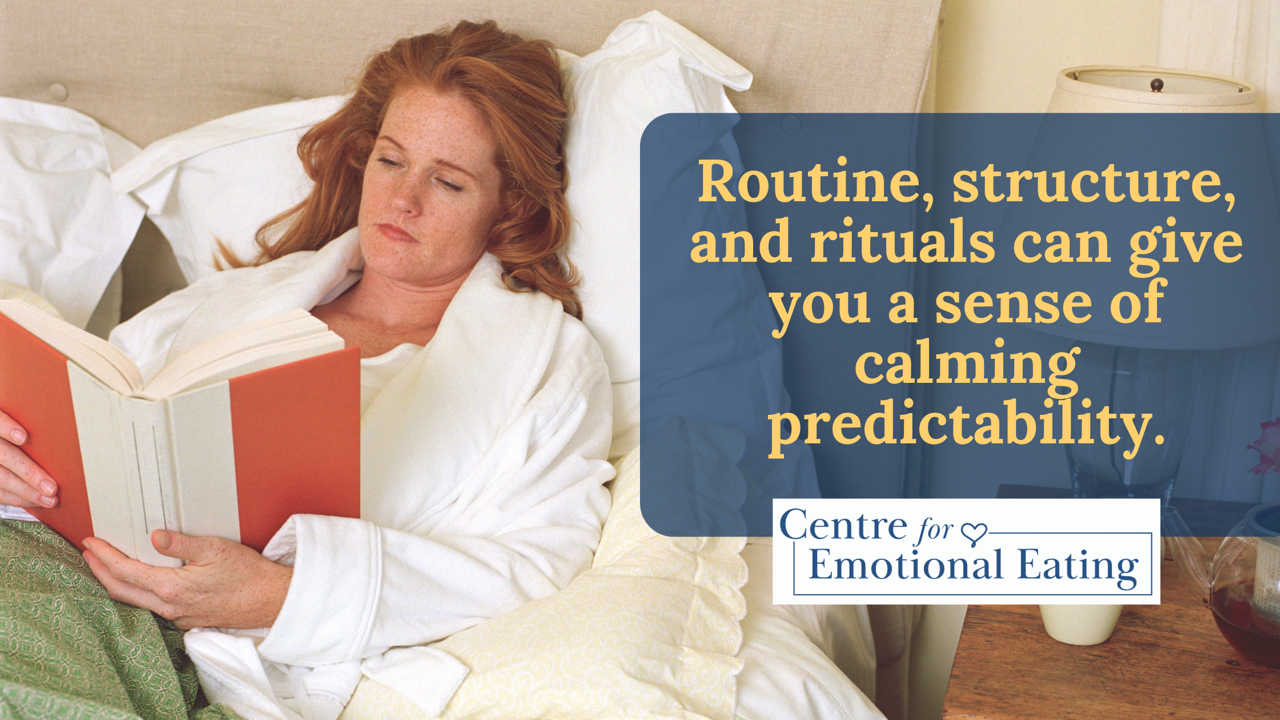
Routines don’t have to be boring! One of the best ways to create certainty and predictability in your life is to have routines, structure, and rituals. These can be big or little things: taking the same route to work or buying the same shampoo so you’ll know how it will smell. It can be having Taco Tuesday’s or reading 30 minutes before you turn the light off for sleep.
Here are three key ways routines can support you:
Helps support your sleep. This is probably one you’ve heard of, but a good routine or ritual before bed can help you get a better night’s sleep because it keeps your body on the same wake-and-sleep ‘clock’. Try lowering the lights (even lighting a candle), putting your phone on silent, or watching your favourite comfort show.
Creates a sense of safety and reduces stress. The predictability of knowing what comes next is a great way to calm your nervous system. Consider the times you worry or are anxious about a situation, chances are you can’t predict how it will turn ...
Five Effective Ways to Ground Yourself
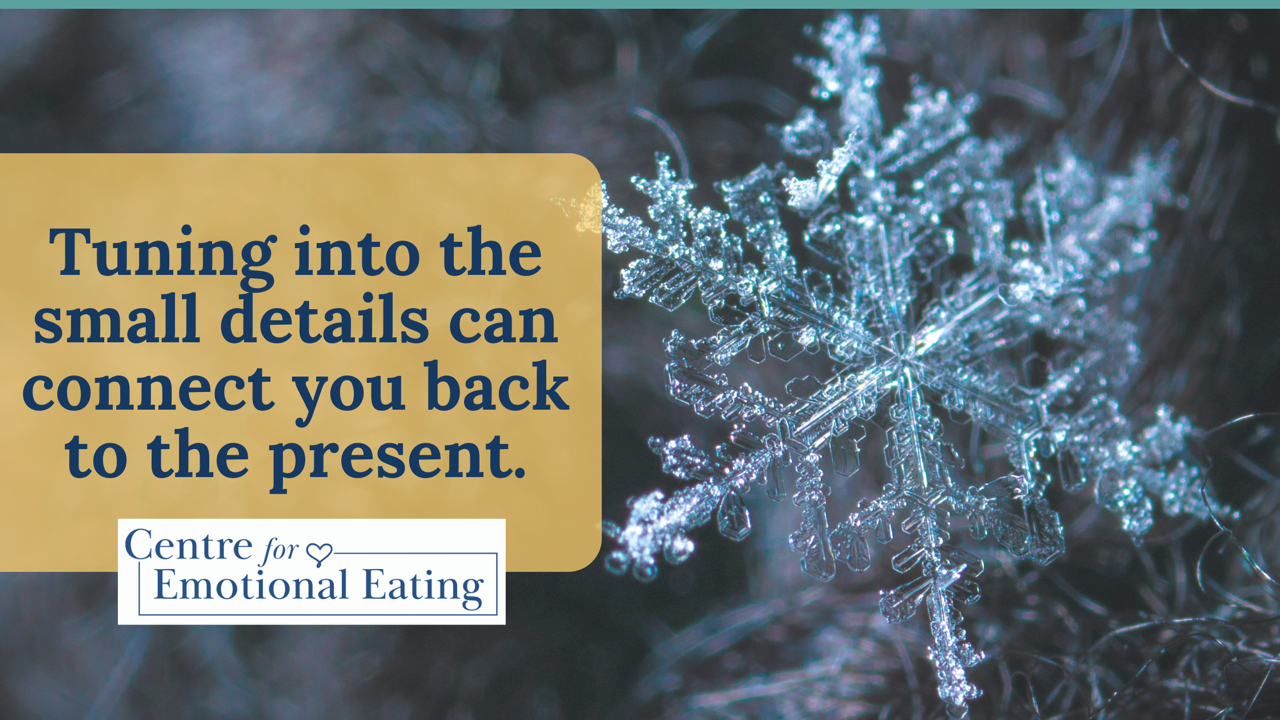
There are many benefits to being able to bring a sense of grounding into your day-to-day life! You don’t have to be someone who has high levels of anxiety (although the strategies below can be helpful), grounding can also make you feel more present, grateful, and connected.
Emotional eaters use food as a way to escape their body, to avoid experiencing certain feelings, either as distraction or numbing. Learning how to ground yourself can help lessen the intensity of these emotions that lead you to use food to cope and even help you emotionally eat less frequently. Try one or all of the strategies below and see what works for you!
Deep breathing. This can be as simple as taking slower, deeper breaths at your own pace or finding a patterned technique that works for you. This is such a great strategy that you can use in a meeting at work, around the dinner table, or just before bed.
Be in nature. Take off your shoes and feel the earth beneath your feet, turn your face to the warm rays ...
Client Insight: “I shifted how I thought about working out and it changed my relationship with my body.”

As an emotional eater you might feel constantly at war with your body. Trying to ignore cravings, stuff down feelings, and constantly critiquing your body. You might even feel betrayed by your body every time the scale goes up or your pants feel tighter.
A lot of this conflict comes from diet culture which encourages us to follow its rules instead of our own needs and wants. One of the most common rules, that you’ve probably engaged in, is the idea that movement is a means to an end to burn the greatest number of calories. If you’ve ever slogged through a workout or pushed past pain to hit a calorie target, chances are you have a not great relationship with movement.
But there are so many reasons to move your body that have nothing to do with your appearance! Read on to start reframing how you move your body and create more appreciation for all it does for you every day!
Forget Calories, Find Play
If you weren’t focused on how many calories you were burning, what movement would you...
Why You Dread Being Bored

Our modern society keeps us hustling: from work to parenting to errands to all kinds of activities. We’re taught that there is value in keeping busy, that being productive should be celebrated. We also are constantly bombarded online with content that highlights people having it all together, going on their next vacation, workout out at 5:00 a.m., or getting a promotion. You feel you have to keep doing to keep up!
And being busy can be a coping mechanism too.
There are a number of reasons you might keep adding to your to do list. First, keeping your mind constantly focused on what you have to do next stops you from having any space to think. It becomes an avoidance tactic that keeps you from feeling or thinking about what you don’t want to. Ever notice when the chaos of the day ends—driving home from work or after the kids are in bed—you end up reaching for food? That’s because constantly being busy is an avoidance tactic just like emotional eating. You can rely on food when your day...


